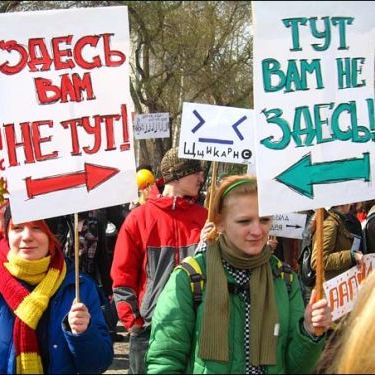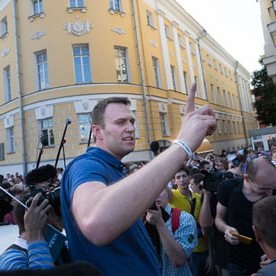The Germans have finally lumped Russia, Ukraine, and Belarus into one group – not only geographically – but politically too. These countries share not only oppressive regimes, but also a history of resistance to them.
The Congress "Protest. Culture. Politics" held in Berlin at the Heinrich Boell Foundation was a perfect illustration of the growing importance of counter-cultures in these three Eastern European countries. These counter-cultures were presented as a peculiar type of performative actions that generate impulses for autonomous and self-styled activities.
There is no winning strategy that states can employ against protesting performers. Take, for example, the Kremlin's battle with the LGBT community – a group that possesses one of the strongest cultural identities in the world. By making LGBT a political enemy, the Kremlin – along with the Russsian Orthodox Church – elevated the sexual minority problematique to the very top of the public agenda. This is a logical trap: since the Kremlin can't afford to ignore LGBT performance actions, it publicly challenges them and, in so doing, only increases the visibility of this opponent. Additionally, many young people would say that it is cool to be in opposition, which only further works to publicly legitimate agendas of resistance. Repressions only aid the popularity of protesting artists. The story of the "Bok o Bok" ("Side by Side") queer movie festival that, despite multiple bans, survived in Russia, is a good illustration of this.
In fact, the situation resembles a struggle for hegemony, though the state operates with brutal force, while its opponents rely on performance actions with high media resonance. Each side is keen on collecting and connecting to each other as many attractive words as possible. One collection of catchy buzzwords has been constructed by the Kremlin: normalcy, family values, natality, demographic security, health of the nation. From the other side of the ideological barricades one can hear a liberal narrative about freedom, equality, tolerance, and diversity. The same goes for depicting each other: the pro-Kremlin groups are eager to reassemble in one semantic chain a list that includes terms such as homosexuality, deviation, prostitution, liberal emancipation, freedom for sin, feminism, and defilement. Their opponents, in the meantime, describe the state as oppressive, restrictive, transgressive, intervening, unduly imposing, disrespectful of privacy, and ultimately totalitarian.
Perhaps, this is a new Russian schism, neither the first nor the last in Russian history. Yet you really have to see what the confrontation between the two camps looks like. An informal group of "Pussy Riot" defenders has shown in Berlin a few videos with brutal attacks on their tents by a street gang after they refused to leave the place upon the warning by the police. The forceful christening of other peaceful protestors by Orthodox zealots was accompanied by a chorus of voices shouting "Orthodoxy or Death." Church vigilantees were seriously saying that those who defend secular values "must leave for a different Universe, since this one is ours." Filthy language was purposefully used to make the threat scarier.
These scenes might look medieval or even dystopian, but they are parts of Russia's contemporaneity. Their absurdity matches the intentional absurdity of some performance actions that certainly bear a spirit of peaceful resistance. The artist Artiom Loskutov from Novosibirsk presented in Berlin his "monstrations" project – a parody to the Soviet-style mass-scale demonstrations. "Monstrations" are about groups of people marching with evidently senseless slogans (like "So what?", "Good President – bad dancer," etc.). Since Russia is steadily moving back to the USSR, this looks quite topical.
Andrey Makarychev is a professor at the Institute of Government and Politics, University of Tartu, blogging for PONARS Eurasia on the Russia-EU neighborhood.











